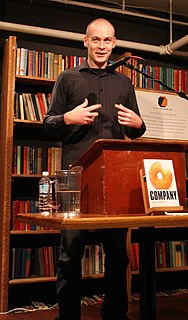A Quote by Robert Genn
Perhaps we might, within the anatomy of our imaginations, think once more of the naked body as a vessel of grace, taste and wonder. In the spotted history of art, stranger things have happened.
Related Quotes
Our mind has its history, just as our body has its history. You might be just as astonished that man has an appendix, for instance. Does he know he ought to have an appendix? He is just born with it....Our unconscious mind, like our body, is a storehouse of relics and memories of the past. A study of the structure of the unconscious collective mind would reveal the same discoveries as you make in comparative anatomy. We do not need to think that there is anything mystical about it.
Whenever we think of the body as a vessel for artistic ideas, we somehow always focus on the surface of the body. But the truth is that there is no surface of the body independent of its interior. It's obvious that the outside of the body is always connected to the inside, to thought processes and to an internal anatomy.
This is the amazing story of God’s grace. God saves us by His grace and transforms us more and more into the likeness of His Son by His grace. In all our trials and afflictions, He sustains and strengthens us by His grace. He calls us by grace to perform our own unique function within the Body of Christ. Then, again by grace, He gives to each of us the spiritual gifts necessary to fulfill our calling. As we serve Him, He makes that service acceptable to Himself by grace, and then rewards us a hundredfold by grace.
Antique art has come down to us in a fragmentary condition, and we have virtuously adapted our taste to this necessity. Almost all our favorite specimens of Greek sculpture, from the sixth century onward, were originally parts of compositions, and if we were faced with the complete group in which the Charioteer of Delphi was once a subsidiary figure, we might well experience a moment of revulsion. We have come to think of the fragment as more vivid, more concentrated, and more authentic.
Feminist art is not some tiny creek running off the great river of real art. It is not some crack in an otherwise flawless stone. It is, quite spectacularly I think, art which is not based on the subjugation of one half of the species. It is art which will take the great human themes -love, death, heroism, suffering, history itself -and render them fully human. It may also, though perhaps our imaginations are so mutilated now that we are incapable even of the ambition, introduce a new theme, one as great and as rich as those others -should we call it joy?
The Advent season is that time when we seek to, in a manner of speaking, mute our memory of what has already happened, that we might brighten our joy that it happened. We leave the already of His advent to taste the bitter of the not yet. We, in short, go back, that we might look forward to His coming.
Men's magazines often feature pictures of naked women. Women's magazines also feature pictures of naked women. This is because the female body is a beautiful work of art, while the male body is lumpy and hairy and should not be seen by the light of day. Men are turned on at the sight of a naked woman's body. Most naked men elicit laughter from women.
Many prefer not to exercise their imaginations at all. They choose to remain comfortably within the bounds of their own experience, never troubling to wonder how it would feel to have been born other than they are. They can refuse to hear screams or to peer inside cages; they can close their minds and hearts to any suffering that does not touch them personally; they can refuse to know. I might be tempted to envy people who can live that way, except that I do not think they have any fewer nightmares than I do. The wilfully unimaginative see more monsters. They are often more afraid.
Perhaps the most difficult task for us to perform is to rely on God’s grace and God’s grace alone for our celebration. It is difficult for our pride to rest on grace. Grace is for other people—for beggars. We don’t want to live by a heavenly welfare system. We want to earn our own way and atone for our own sins. We like to think that we will go to heaven because we deserve to be there.
Like many people, I have no religion, and I am just sitting in a small boat drifting with the tide. I live in the doubts of my duty.... I think there is dignity in this, just to go on working.... Today we stand naked, defenseless, and more alone than at any time in history. We are waiting for something, perhaps another miracle, perhaps the Martians. Who knows?





































